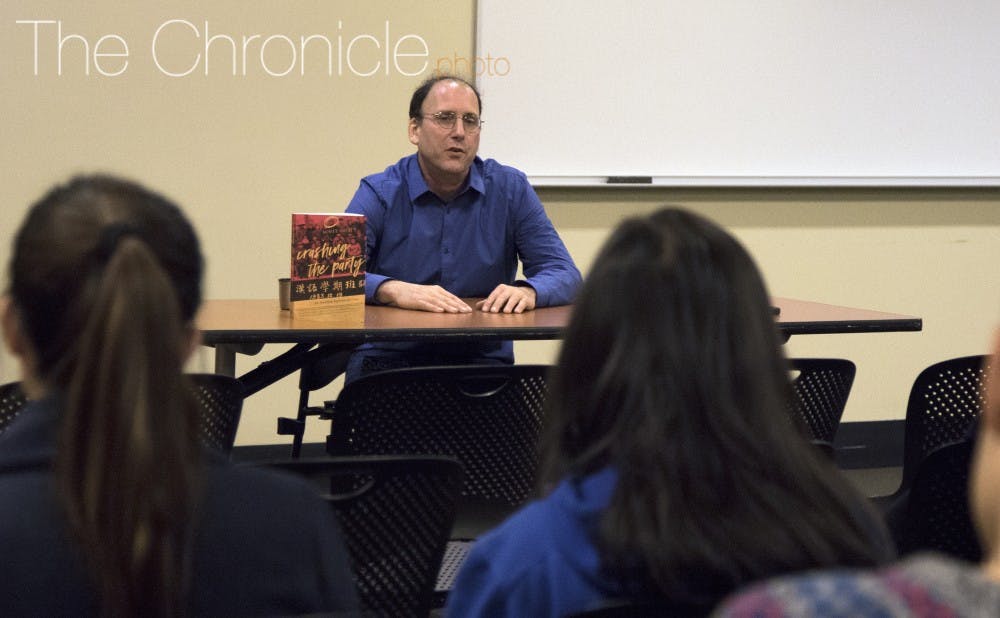Scott Savitt has seen nearly all aspects of Chinese life during his two decades as a journalist in the country—including the inside of a jail cell.
Savitt, currently the in-house English-Chinese translator for The New York Times, graduated from Duke in 1985 after becoming one of the first exchange students to go to China in 1983. He returned to the country as a foreign correspondent for the Los Angeles Times. During his time in China, he witnessed the Tiananmen Square protests and was imprisoned for publishing his own newspaper. He returned to Duke Tuesday to share his experience with the Duke East Asian Nexus and discuss his book "Crashing the Party."
“In the summer of 2000, I was looking out the window of my office, drinking my morning tea,” Savitt said. “All of a sudden, all of these police cars started driving up. At first I thought, ‘Oh, someone’s going to have a bad day!’ Then I realized that someone was me."
The journalist, who wrote for The Chronicle when at Duke, was handcuffed and escorted to a Beijing jail, where he would remain for the next month. His newspaper—the "Beijing Scene," the first independent English-language newspaper in the country—was shut down.
During his imprisonment, Savitt said he practiced meditation and refused to eat. He began writing the first draft of his book on toilet paper in his Chinese prison cell.
After being released from jail 30 days later, he was deported to San Francisco and “blacklisted” from traveling to China.
“As a journalist, you want to see everything. It was really a good experience, actually,” he said of his prison stint. “You come face-to-face with your demons.”
Savitt describes this experience in his book, which covers his two decades in the country and the struggles of being a Western journalist abroad. He compared Chinese society’s view of journalism to that of sausage—they might like the finished product, but don’t want to see how it’s made.
One of the biggest stories to come from China during his time there was the 1989 Tiananmen Square massacre. The Duke alum noted that he was the same age as the student leaders who organized the protests, making his connection to the event even more personal.
He said the massacre was wholly unnecessary, and that the government deciding to send in the military was a “conscious” decision.
“They could have cleared that Square with no guns, easily. That was something totally different,” Savitt said. “The leadership did not handle it well. Talking with them would have gotten them to leave easily with just a promise to work towards democracy, but democracy is messy."
Savitt also commented on the current state of journalism in China, noting that it mostly consists of propaganda.
But it is important to fight against such censorship, he said, even though the danger associated with fighting censorship can be palpable. Several journalists he knows have been imprisoned because of it, he added.
Junior Ayden Sng, a member of Duke East Asian Nexus and one of the talk's organizers, said that he appreciated Savitt’s perspective.
“I think it was very meaningful because he comes from Duke,” Sng said. “I feel that it is very rare to find a Western perspective on something that is so uniquely Chinese. The fact that he can give us a modern perspective contextualized by 20 years in China—that is very hard to come by.”
Savitt, however, said that he would do things differently if he was first going into journalism today.
“Now, I wouldn’t go to China to be a journalist,” he said. “I would stay right here. This is going to be the front line going forward.”
Get The Chronicle straight to your inbox
Sign up for our weekly newsletter. Cancel at any time.
Bre is a senior political science major from South Carolina, and she is the current video editor, special projects editor and recruitment chair for The Chronicle. She is also an associate photography editor and an investigations editor. Previously, she was the editor-in-chief and local and national news department head.
Twitter: @brebradham
Email: breanna.bradham@duke.edu

